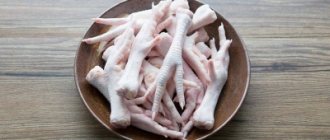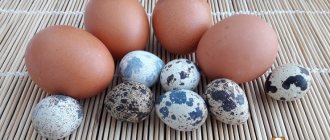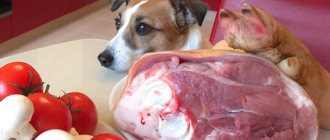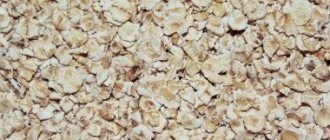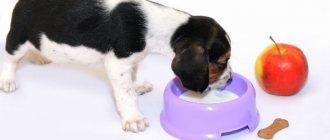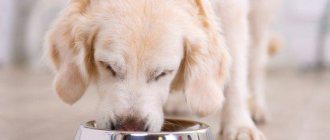Sometimes owners, pampering their pet with some human product, do not even realize that they can seriously harm it. From this article you will find out: is it possible to give dogs the nuts that humans so often consume? We will analyze all the popular types of nuts, find out how dangerous each of them is, to whom this product is contraindicated, and what needs to be done if your pet is poisoned or the nut gets stuck in the throat.
It also happens that some human food products will be very useful for dogs and will strengthen the dog’s immunity and health. Let's look at the question in detail: do nuts help improve health more or, on the contrary, cause irreparable harm to the body?
What are the benefits and dangers of nuts for dogs?
Many dogs beg their owners for nuts when they see them eating them. Good-natured owners usually do not refuse their pet, but they do not always know that nuts can be harmful to the animal’s body.
The body of a dog and a person works differently. What is good for human health can have the opposite effect on a dog and harm your pet.
We strongly do not recommend pampering your dog with nuts:
- This product has a high calorie content, which can lead to overweight of your four-legged friend.
- There is a high probability of getting urolithiasis due to the high concentration of iron.
- Nuts can often cause allergies, accompanied by itching and poor digestion with gas formation.
It is better to replace such a delicacy with a more gentle one. You can give fruit or a special treat from a pet store. But there are nuts that benefit the animal’s body, but not in large quantities.
How about peanut butter?
Can dogs eat peanuts? It’s clear. But sometimes owners give their dogs paste or oil as a treat. In this case, it is very important to read the composition of the product on the packaging. Often, such gastronomic products contain xylitol, a sugar substitute. It is a highly toxic ingredient for dogs. Manufacturers often replace its presence in the product with the words “natural sweetener” or “sugar alcohol.”
Xylitol, even in small amounts, can cause hypoglycemia in a dog - a drop in blood sugar. This component also destroys the pet’s liver.
Peanut butter without xylitol can be offered to your pet in limited quantities - no more than a teaspoon per day.
What nuts are allowed and not allowed?
Nowadays, there are a huge number of nuts on store shelves. We will analyze each type in detail and you will find out what you can treat your dog with and what is better to keep for yourself.
Peanut
You can treat your tailed friend to this fruit from the legume family, since it is the safest. You can treat your pet to homemade peanut butter (not salted), and then give it a serving equal to one teaspoon. But some people still have an allergy to such a treat, so carefully monitor your dog after the first treat of peanuts or butter.
Brazilian
It can be offered, but only in small quantities. We recommend giving no more than one piece of product per day. If the restriction is not followed, diarrhea may occur.
Walnuts
We strongly ask you to protect them for yourself, since walnuts are among the most unsafe nuts for dogs, causing poisoning and other digestive disorders.
Animals often find them on their own and gnaw them along with the shell. The shell will cause severe intestinal obstruction. Also, mold causes a great danger, which will cause various neurological disorders (tremors, convulsions).
Acorns
Acorns can be called dog poison because they can lead to kidney failure. Substances such as gallotannins, which cause kidney failure, are to blame. They are found not only in the acorns themselves, but also in oak leaves.
Chestnut
We are talking about the form that people can consume. Chestnut also falls into the category of unfriendly treats due to possible problems with the pancreas and diarrhea if consumed in large quantities.
Cedar
It is cedar that is considered safe and easy to assimilate by the body. It is worth remembering to use moderate amounts (a small handful) and not to give daily.
Cashew
They have less fat content when compared with their counterparts. Give these nuts in slightly larger quantities than when treating others. Cashews contain very useful elements - calcium and magnesium. Do not give the product only for bait, but rather buy special vitamins or high-quality food that will contain a balanced amount of vitamins.
Coconut
Coconut contains laurin, which is able to fight viruses and bacteria and strengthen the immune system. Therefore, you can give this product to your dog. Coconut is also useful because it helps solve the problem of difficulty breathing and cope with itching. Coconut oil and milk are also safe.
Macadamia
Macadamia is one of the most poisonous foods for dogs.
Often unpleasant symptoms of poisoning such as vomiting, lethargy, and high body temperature appear. Animals sometimes cannot walk due to weakness. It also has a negative effect on the nervous system.
Almond
It is better not for a dog to eat a nut like almonds. This species is toxic. May cause blockage of the esophagus or rupture of the tracheal core if the product is not chewed thoroughly. And almonds with salt are even more dangerous, because they retain water in the body and very often lead to the death of pets. Dogs that are prone to heart disease are most at risk.
Muscat
May cause the same unwanted effects as macadamia nuts. To all this is added the likelihood of the animal falling into a coma and dying after some time.
Pecan
It is undesirable to give this type of nuts, since consuming large portions can cause diarrhea, upset stomach, and in some cases, the death of the animal.
Pistachios
They contain large amounts of fat, which leads to obesity and diarrhea. A product that has been left idle for a long time becomes covered with mold, which you may not even notice. Due to the slightly open shell, mold can easily crawl inside.
Mold contains neurotoxins, which are very dangerous. In stores you can often see pistachios only in salted form, which is also bad for animals. Therefore, it is better to save such a product for yourself or treat your friends and acquaintances.
Hazelnut
Frequent use may cause bladder stones. Stones are formed due to the huge amount of iron in hazelnuts.
Possible dangers
Nuts contain a large amount of vegetable fats, and therefore they are very high in calories. Depending on the type, the value can be 500-800 Kcal, which significantly increases the risk of developing pancreatitis. Many types of nuts contain high amounts of iron, which leads to the formation of bladder stones.
Nuts are difficult for the body to digest. Dogs often do not chew them when they eat them, which leads to the accumulation of gases in the intestines. Nuts can also cause poisoning.
Failure to comply with harvesting and storage standards leads to the appearance of mold on the surface of the nuts. Eating them causes inflammation of the gastrointestinal tract. If this is not fatal for a person, then in the case of a dog it is fraught with death for the pet.
What to consider when feeding
Nuts must be of good quality and must be free of mold. When feeding nuts, it is worth giving the product in large quantities, since you never know how such a product will affect the animal.
Sometimes children can spill nuts, so you should remove them immediately before the dog runs into them. After all, the child does not always understand what happened.
And it’s better not to play roulette at all, but to eat the nuts yourself, instead of giving them to the dog for a few minutes of pleasure. You can buy just a tasty treat or delicious food rich in vitamins.
Fish and fish products
Yes, dogs can fish. It contains healthy fats and amino acids, giving a good boost of health. Salmon and sardines are especially healthy.
Salmon contains vitamins and protein, and sardines have soft, digestible bones, useful as an additional source of calcium
. With the exception of sardines, be sure to remove all bones from the fish.
Never feed your dog raw or undercooked fish. Only fully cooked and chilled (not hot), and limit your fish intake to no more than twice a week.
Salmon
Can. Fully cooked salmon is an excellent source of protein, healthy fats and amino acids. It improves health, improves brain function and gives the immune system a boost. However, raw or undercooked salmon contains parasites that can cause illness, causing vomiting, diarrhea, dehydration and, in extreme cases, even death. Be sure to cook the salmon at a high temperature to kill any parasites.
Shrimps
Can. A few shrimp every now and then are great for your dog, but only if they are fully cooked and the shell (including the tail, head and legs) is completely removed. Shrimp is a healthy food that is high in antioxidants, vitamin B-12 and phosphorus, and low in fat, calories and carbohydrates.
Tuna
It's possible in moderation. Tuna is a source of Omega-3 fatty acids, which promote heart and eye health. As for canned tuna, it contains small amounts of mercury and sodium, which should be avoided. A little canned tuna and tuna juice, cooked in water, not oil, without spices, can be given to your dog.
Puppies, pregnant and lactating
Anyone in this category should not be given nuts, especially puppies.
Babies have a rather weak body that may not tolerate such heavy food. But you can give pine, cashew and peanuts, since they are considered the safest types while babies are at such an early age.
Puppies should rarely be fed them. The serving should be approximately two or three times smaller than that for an adult dog. For puppies less than a year old, this type of treat is contraindicated, since their body is not yet strong and has not fully developed.
It is strictly contraindicated for pregnant women to give nuts, and nursing mothers can eat no more than four nuts per day, as they help improve lactation. This will please puppies who feed on their mother's milk. Give nursing mothers only the nuts recommended for puppies.
Grain and bread
Bread
Yes, dogs can eat bread. A small amount of plain bread (no spices and, most importantly, no raisins)
) won't harm your dog, but it won't provide any health benefits either. Bread has no nutritional value, but does contain carbohydrates and calories. Homemade bread is a better option than store-bought bread, as store-bought bread usually contains unnecessary preservatives that are best avoided.
Wheat
Dogs can eat. Wheat and corn grains are excellent sources of protein, essential fatty acids and fiber.
Corn
Dogs can eat corn. Corn is one of the common ingredients in most dog foods. However, the cob may be difficult for her to chew and digest, which can cause intestinal blockage.
Popcorn
Can. No salt, no butter, just popcorn, good in moderation. It contains riboflavin and thiamine, which promote eye health and digestion, as well as small amounts of iron and protein.
If it gets in the throat
It happens that dogs choke on nuts due to their large size. The nut just gets stuck in the throat and doesn’t go anywhere. Choose small nuts or chop them into small pieces. When a nut gets stuck in your dog's throat, you need to help him cough it up. Follow this instruction:
- Place your fist under your pet's chest;
- Squeeze the animal’s body, directing it forward and upward;
- Do six or seven sets;
- If your pet is unable to cough up food, then take him to the vet immediately.
Miscellaneous
Chocolate
No, dogs should not be given chocolate. Chocolate contains substances that are very toxic to dogs, methylxanthines, which stop the dog's metabolic process.
. Even a little chocolate, especially dark chocolate, can cause diarrhea and vomiting in your pet. Large amounts can cause seizures, irregular heart function, and even death. If your dog has ingested chocolate, take him to the vet as soon as possible.
Cinnamon
This is not for dogs. It is not toxic to dogs, but it is best avoided. Cinnamon and its oils can irritate the inside of a dog's mouth, lowering blood sugar levels too much, which can lead to diarrhea, vomiting, increased or decreased heart rate, and even liver disease. If a dog inhales cinnamon powder, it may cause difficulty breathing, coughing, and choking.
Eggs
Can. Eggs are safe for dogs when cooked well. Boiled eggs are an excellent source of protein and can help relieve indigestion. But a raw egg can cause biotin deficiency, so cook it first.
Garlic and onion
Dogs are not allowed to have them. Like leeks and other onions, garlic is part of the Allium family and is five times more toxic to dogs than other plants in the Allium family. Garlic can cause anemia in dogs. Garlic and onion poisoning may have delayed
symptoms, so if your dog has eaten garlic, monitor it for several days rather than immediately after consumption.
Briefly about the main thing
- In most cases, nuts cause either diarrhea or poisoning in dogs.
- You can give your dog: peanuts, Brazil nuts, pine nuts, cashews, coconut. But do not forget that your dog may be allergic to protein; carefully monitor the reaction.
- It is forbidden to give nuts: walnuts, acorns, chestnuts, macadamia, almonds, nutmeg, pecans, pistachios.
- Always monitor the amount of nuts your pets eat or avoid eating this product altogether.
- Vitamins can be obtained from various other treats. For example, you can treat your pet to a piece of cracker or a piece of some tasty fruit.
- If your dog is poisoned, take it to the vet immediately.
Possible or not - recommendations from veterinarians
Many dog breeders disagree on whether it is possible or not to give dogs such a high-calorie product as nuts. Some argue that a small amount of nuts will benefit a young growing body. Others are inclined to believe that nuts cause an allergic reaction and contribute to pet obesity.
On a note! 100 g of nuts contain from 550 to 900 kcal. For an animal, this dose is very high in calories.
Be that as it may, veterinarians advise following simple rules so as not to harm your pet:
- Give only fresh nuts in their raw form, without adding salt, sugar, flavoring, chocolate or icing.
- Give your dog only one type of nut to try on one day, and monitor his well-being for 2-3 days. Then increase the portion and again observe the behavior and health of the pet. Only after this can you try giving a different type of nut.
- The weight of the first portion should not exceed 10 g or 1-2 large nuts.
- There should be no traces of mold or rot on the fruits. This will cause disruption in the gastrointestinal tract.
The table clearly shows which nuts dogs can eat and which ones are strictly prohibited for them to eat:
| Can | It is forbidden |
| Cedar | Walnut |
| Almond | Pistachios |
| Chestnut | Hazelnut |
| Brazilian nut | Nutmeg |
| Cashew | Macadamia |
| Peanut | Pecan |
| Coconut | Acorns |
Now let’s take a closer look at why you can or cannot give certain fruits to your pet.
Video
You will learn more about what else dogs can and cannot eat from products intended for people in this video:
The owners are usually very kind and generous people. When you own a pet, you share not only your space with them, but also your heart and soul.
It is very good when owners show care and love for their pet without denying them their goodies, but they rarely think about what the consequences may be. And the consequences can even be very dire. Those foods that people can easily digest become a real threat to the health and life of a pet. Even after successful recovery, some health problems may remain.
I advise you to always learn about products that are safe and dangerous for your four-legged friends. Or it’s better not to risk it at all, but to pamper your dog with delicious food designed especially for him.
Different types of meat/poultry
Pork
Dogs can eat pork. It is a highly digestible protein with amino acids and contains more calories than other types of meat. Pork does not usually cause an allergic reaction compared to other meats.
Ham
Can. Ham is good for dogs, but it is certainly not the healthiest type of food. Ham is high in sodium and fat, so you can only give a small piece.
Turkey
Turkey is good for dogs, but without the garlic and seasonings. Also be sure to remove excess fat and skin from the meat and be sure to check the bones; The bird's long bones can splinter, causing blockages or even ruptures in the intestines, and should not be given to your pet.
Can dogs be allergic to peanuts?
Just like humans, dogs can also be allergic to peanuts. Although peanut allergies are rare, it is still helpful to be aware of the symptoms.
The severity of the disease can range from mild to severe. Symptoms may include red and itchy skin, excessive licking, bald spots, overstimulation and, in severe cases, difficulty breathing.
Therefore, peanuts can be given to dogs as a small treat as long as they are fresh, unshelled and unsalted. If your pet eats peanuts for the first time, give them a little to see how they react.
Content
1. Can dogs eat nuts? – Considering useful tips 2. Recommended nuts 3. Types of nuts 4. Which nuts are completely prohibited?
Often people literally “stuff” their pets with a variety of foods, without even thinking about the benefits. The reasoning goes something like this: “if it’s good for me, then why should it be the other way around for my beloved dog?” And without even specifying whether dogs can have nuts, some fruits or vegetables, without even consulting a veterinarian, they simply add them to the diet. And thus cause irreparable harm to animals.
If you read various forums and chats of dog breeders, you can come across completely opposite points of view. Some breeders claim that nuts are very beneficial for dogs, especially puppies with rapidly growing bodies. Others, on the contrary, argue that this food product literally kills pets. In their own way, both sides are right, they just don’t specify what specific species they are talking about? Let's try to understand this issue too.
They are high in calories and can lead to weight gain
For dogs that are overweight or prone to weight gain, nuts should be avoided.
For example, if you give your dog a small amount of peanut butter to take pills, you should not allow the calories provided by all combination treats (including peanut butter) to exceed 10% of their total daily calories. This helps prevent treats from throwing your dog's diet out of balance.
This table shows the approximate calorie content (kcal/100g)* of different types of edible nuts without shell:
| Nut type | Calorie content (kcal * / 100 g) |
| Blanched almonds | 590 |
| Almonds, dry roasted, unsalted | 598 |
| Cashews, dry roasted, unsalted | 574 |
| Cashews, raw | 553 |
| Peanuts, roasted unsalted | 587 |
| Peanuts, raw | 567 |
| Pecans, dry roasted, unsalted | 710 |
| Pecans, raw | 691 |
| Pistachios, roasted, unsalted | 572 |
| Raw pistachios | 560 |
| Walnuts, English raw | 654 |
